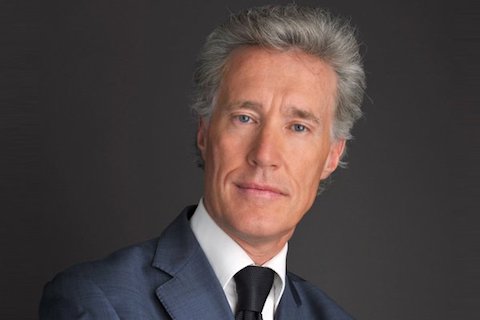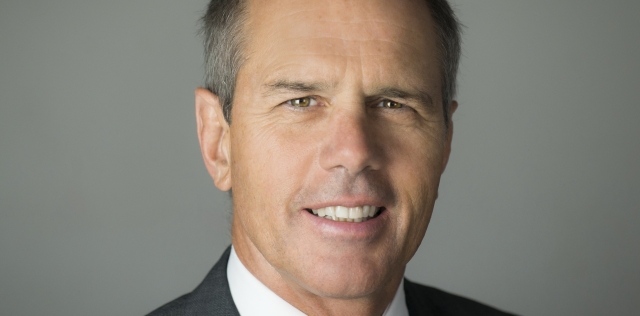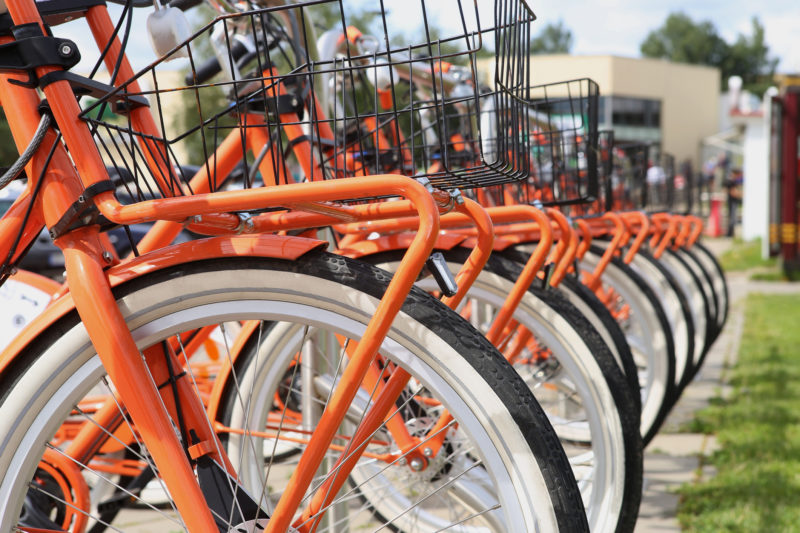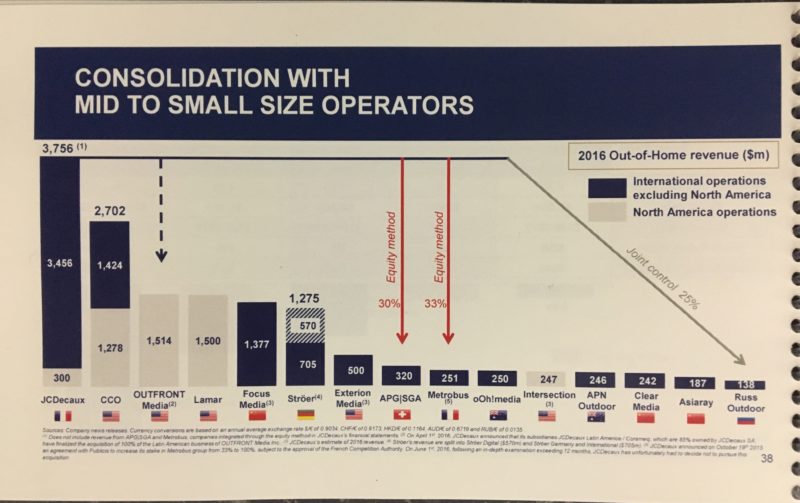
‘We are here to stay’: The future of JCDecaux in Australia
As the City of Sydney outdoor advertising tender fast approaches, the incumbent JCDecaux is being put under the microscope. Mumbrella’s Zoe Samios chats with Jean-Francois Decaux, the out of home giant’s chairman and co-CEO, and Steve O’Connor, CEO of JCDecaux Australia, about the future of the French media giant on our front doorstep.
When Jean-Francois Decaux – the chairman and co-CEO of the world’s largest outdoor media company – landed in Australia last week, his visit raised some eyebrows.
The French CEO, who was responsible for JCDecaux’s first expansion into Australia, came to officially announce the win of Melbourne’s newly expanded Yarra Trams contract, along with the renewal of its Telstra contract, which will see new kiosks installed across Australia’s five metro cities.
As the week came to an end, one thing became clear: the Decaux family have no intention of exiting the Australian market.
But the eldest son of JCDecaux founder Jean-Claude Decaux could never have expected almost $100m in revenue to eventually come from his Australian operations.

Jean-Francois Decaux is the eldest son of Jean-Claude Decaux, and was responsible for the expansion into the Australian market
He reflects on his visit to Australia to meet former City of Sydney mayor Frank Sartor in 1997 ahead of the Sydney Olympic Games, at a time when the quality of street equipment was “appalling”.
“The city was considering buying bus shelters, toilets, benches, you name it and I set up a meeting with the mayor, Frank Sartor, and took him through our business model, which was invented by my father back in Europe in 1964,” Decaux says.
“He liked the idea, came to Europe to visit us and some other companies as well, and he came back to Sydney and decided to launch a tender for a 20 year contract asking those companies to come back with proposals for the beautification of Sydney at no cost to the taxpayers.
“We won. I commissioned Philip Cox to design a range of street furniture which is still looking as good as it was when we built it in 1999 just before the Olympics, so the concept worked well.”
Since then, the business has continued to grow. In Australia alone, the company has almost 7,000 assets, with 7,150 advertising faces across Sydney, Melbourne, Brisbane, Adelaide and Perth.
While Decaux still thinks the company’s Australian presence is small, he argues his is the best in terms of innovation and quality.
And the landmark win in Melbourne will give the company the capacity to almost double the size of its operations, he says.
Previously, the Yarra Trams contract was split by tram shelters and tram bodies, but it was consolidated in the most recent tender.
“We won and we are very glad we are able to transform the media landscape in Melbourne,” Decaux says.
The contract will see the installation of 300 high definition screens across the city.
“It’s also the first time a single company in the out of home space is able to sell both the tram bodies as well as the tram shelters, which are the most visible outdoor assets in central Melbourne,” he adds.
“We expect to be reaching $200m by 2019, about two years from now, which would give us around 20% market share and all this would’ve been achieved organically.”
Australian boss O’Connor points to depth of resources and global expertise, when reflecting on the business’ success.

O’Connor says all announcements made in the last week are a strong indicator JCDecaux is here to stay
“We can boast the fact we have hundreds of engineers sitting in various places around the world, 200 located in Paris, whose sole focus is to refine the existing products and find new ones and that’s not just in relation to furniture,” he says.
“I don’t think the business ever set out to become the biggest in the world, but it just did because it was the best and that’s because we are good at what we do.”
City of Sydney
Inarguably, the biggest local contract in out of home is for the City of Sydney’s outdoor advertising rights, which JCDecaux won in 1997. And in a short period of time, that contract will be up for grabs again.
While Decaux and Steve O’Connor both note they don’t know the scope of the tender, they have a well-prepared and considered approach for what’s to come.
Decaux points to bike sharing schemes, automated toilets and upholding maintenance of properties as he looks to the future of the City of Sydney.
“When I see the bikes here in Sydney, sometimes you have seven bikes in one corner,” Decaux says frustratedly.
“It’s disorganised. This is not how cities should be run. Some cities are starting to regulate those Chinese bikes where you can drop them everywhere. It is convenient for the users, but it is not that well organised and some cities are waking up and saying ‘No, we don’t want this kind of mess on the sidewalks, we want this well organised system’.
“We recently won Stockholm on the basis of a system where we no longer have stations like we have in Brisbane.
“We have a stationless system, but you cannot unlock or lock your bike without your application on your phone if you are not in a designated virtual station. We will have about 100 virtual stations and you won’t be able to lock the bike through a GPS connection if you are not within that virtual station.
“If you can’t lock the bike and the bike gets stolen – you will have to pay a fine. That’s how we are evolving the concept that we invented, giving more flexibility but also taking into account the fact the city needs to be well maintained and well organised.”
Beyond the current tender, there could also be scope for a new tender for Sydney’s Light Rail once it reaches completion.
O’Connor tells Mumbrella when it comes up, it’ll definitely be something JCDecaux bids for: “There’s not going to be any advertising at the light rail stops as far as we know, that was the arrangement made between the State Government and The Council but there will be obviously advertising on the vehicles themselves and yes that does make sense and we would definitely bid for that.”
Decaux adds there is a benefit to bundling all services – including automated toilets and bike schemes – into the outdoor tender, as one operator can manage all the services of the facilities.
“We don’t sub-contract the maintenance – we train our maintenance people and it’s in our best interests to maintain the equipment at a very high standard. Sydney benefits from the efficiencies.”
But with the announcements this week, what O’Connor can confidently tell Mumbrella is the out of home giant is here to stay.
“We are getting bigger and we certainly don’t intend to lay down and die when it comes to the City of Sydney tender, given the fact we have now have the strongest position in Melbourne and Brisbane and most outdoor advertising campaigns are concentrated in Sydney and Melbourne but also Brisbane – if you combine those three cities it’s 88% of outdoor spend – that we have good strong momentum in those two other markets other than Sydney, which is obviously going to help us with Sydney. We are here to stay.”
Another area which the out of home giant is interested in is Sydney Airport, expressing strong interest to Glyn Williams, general manager of retail last Friday.
“As the largest airport advertising operator in the world with a network of 225 airports including seven of the top 10 such as London, Paris, Frankfurt, New-York / JFK, Los Angeles, Shanghai, Hong-Kong, Dubai, Singapore… delivering 30% of all passenger eyeballs, we are best positioned to maximise revenues,” Decaux tells Mumbrella.
A ‘pure play’ out of home company
The partnership between out of home and mobile will offer benefits, inevitably providing the ability to use targeted data from a small device combined with the benefits of a wide reach ‘broadcaster’.
But Decaux says he’s completely unconvinced by other synergies – such as combining radio with out of home.
“20 years ago when we went public a lot of investors in the US, Fidelity, Genis, they were very skeptical about our companies surviving against media giants Clear Channel and CBS, because everybody was buying the concept of packaging radio, television and out of home. It never ever worked.
“The pure players are the winner. We are a pure player company, we have been a pure player company for the last 50 years and we remain a pure player company,” he says.
“We are completely unconvinced about the synergies between radio and out of home, which was the business model of HT&E – our competitor, which was the business model of Clear Channel, which is the second biggest out of home media company. They were trying to get more revenue out of the advertisers and it was the other way around.
“Both Clear Channel and CBS in the states ended up either selling their outdoor businesses, or separating their radio from the outdoor business. Here in Australia, HT&E – formerly APN News & Media – is convinced that it’s a better business model to have radio and outdoor integrated.”
Let the transparency debate “crack on”, JCDecaux is “squeaky clean”
In the last year, heightened discussions have occurred around transparency and measurement in out of home. The debate is centered around whether advertisers and media agencies are getting value for money, particularly on digital devices.
In some cases, agencies and advertisers are not getting the share of voice they are promised. Companies like Seedooh and Outdoor Inspection Services aim to tackle the problem in different ways.
But O’Connor assures Mumbrella JCDecaux is “squeaky clean”.
“We are certainly not guilty of the things that some of the other companies are being accused of. We’ve stuck rigidly to one in six, that’s what we’ve always done and what we will always continue to do. So we are very very happy for this debate to crack on because we are squeaky clean,” he says.
“The next step for us as a business is to make sure we can prove that. We’ve got this platform called Seedooh out at the moment. They are really good and they have a really good platform and we are talking about how we might integrate that into our business because that’s proof that we are providing advertisers with what they’ve paid for and that’s really key.
“Not naming names, but I think some of the outdoor operators have really taken liberties in the space. It’s a shame.”
Last year when Mumbrella spoke with a number of out of home companies, Brendan Cook, CEO of Ooh Media, argued future share of voice would be defined by areas such as weather temperature and time of day.
O’Connor and Decaux both agree.
“The argument has been by media agencies – and quite rightfully so – that they have bought a campaign expecting to get a certain share of voice – that is currently one in six but the trouble is that’s not what’s transpired. They’ve got one in eight or one in ten or one in 12 unbeknownst to them and that’s what they are really upset about,” O’Connor says.
“If you are promising something and you are delivering it based on what you’ve promised that’s fine, and if it’s share of voice, if its 20% share of voice, 10% share of voice, as long as you’re delivering what you’re committing to deliver I don’t think anyone could be upset about that.”







